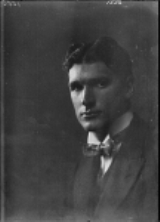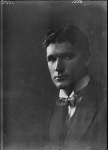
Frank Nelson Doubleday
Encyclopedia

Biography
Frank Doubleday was a native of Brooklyn, New York, the son of a hatter. Early in life he became fascinated with the printing business and by the age of ten he had saved up enough money to buy his own printing press. He earned back his investment by printing advertising and news circulars for local businesses, and from that point never left the business. When Doubleday was 14, his father's business failed, and he was forced to leave school and find a full-time job. He went to work at the firm of Charles Scribner's SonsCharles Scribner's Sons
Charles Scribner's Sons, or simply Scribner, is an American publisher based in New York City, known for publishing a number of American authors including Ernest Hemingway, F. Scott Fitzgerald, Kurt Vonnegut, Stephen King, Robert A. Heinlein, Thomas Wolfe, George Santayana, John Clellon...
in Manhattan for the salary of $3 a week. Doubleday spent eighteen years at Scribner's, eventually rising to become the publisher of Scribner's Magazine
Scribner's Magazine
Scribner's Magazine was an American periodical published by the publishing house of Charles Scribner's Sons from January 1887 to May 1939. Scribner's Magazine was the second magazine out of the "Scribner's" firm, after the publication of Scribner's Monthly...
and head of Scribner's subscription book department.
When Doubleday's relationship with J. Blair Scribner soured, he left the company and went into partnership with Samuel S. McClure, publisher of McClure's Magazine, to form the Doubleday & McClure Co. in March, 1897. The following year, Doubleday and McClure accepted a contract to manage the great publishing house of Harper & Brothers
Harper & Brothers
Harper is an American publishing house, the flagship imprint of global publisher HarperCollins.-History:James Harper and his brother John, printers by training, started their book publishing business J. & J. Harper in 1817. Their two brothers, Joseph Wesley Harper and Fletcher Harper, joined them...
, at the instigation of their banker, J. Pierpont Morgan. On taking control, Doubleday dug thoroughly through Harper's books and decided that the company's finances were in a shambles, and Doubleday convinced McClure and Morgan to call off the deal. (Harper had gone heavily into debt in the Panic of 1893
Panic of 1893
The Panic of 1893 was a serious economic depression in the United States that began in 1893. Similar to the Panic of 1873, this panic was marked by the collapse of railroad overbuilding and shaky railroad financing which set off a series of bank failures...
, and the extension of copyright
Copyright
Copyright is a legal concept, enacted by most governments, giving the creator of an original work exclusive rights to it, usually for a limited time...
to foreign authors in 1891 put a large dent in Harper's principal business, cheap domestic reprints of respected foreign authors.)
On December 31, 1899, growing tension between Doubleday and McClure led the two men to dissolve their partnership. The following year, Doubleday invited Walter Hines Page
Walter Hines Page
Walter Hines Page was an American journalist, publisher, and diplomat. He was the United States ambassador to the United Kingdom during World War I.-Biography:...
, former editor of The Atlantic Monthly
The Atlantic Monthly
The Atlantic is an American magazine founded in Boston, Massachusetts, in 1857. It was created as a literary and cultural commentary magazine. It quickly achieved a national reputation, which it held for more than a century. It was important for recognizing and publishing new writers and poets,...
, to join him; the new firm was Doubleday, Page & Co.
In 1921, Doubleday bought a controlling interest in the English publisher William Heinemann
Heinemann (book publisher)
Heinemann is a UK publishing house founded by William Heinemann in Covent Garden, London in 1890. On William Heinemann's death in 1920 a majority stake was purchased by U.S. publisher Doubleday. It was later acquired by commemorate Thomas Tilling in 1961...
, after the eponymous senior partner died unexpectedly without leaving an heir. In 1927, Doubleday purchased the publishing house of George H. Doran, and the company became Doubleday, Doran & Co.
Doubleday was twice married, first to Neltje De Graff, and then to Florence Van Wyck. He had a son by his first wife, Nelson
Nelson Doubleday
Nelson Doubleday was a U.S. book publisher. He was the nephew of author Russell Doubleday, the son of Frank Nelson Doubleday and Neltje Blanchan, and the father of Nelson Doubleday Jr....
, who followed him into the publishing business and took over for his father after developing a promising mail-order business on his own (now part of BookSpan). An anglophile, Frank Doubleday spent many working vacations in England looking to sign up authors and publishers for U.S. editions. His personal friends included James Barrie, Andrew Carnegie
Andrew Carnegie
Andrew Carnegie was a Scottish-American industrialist, businessman, and entrepreneur who led the enormous expansion of the American steel industry in the late 19th century...
, Alfred Harcourt
Alfred Harcourt
Alfred Harcourt was an American Publisher, Compiler and Founder of Harcourt, Brace & Howe in 1919....
, Edward Mandell House, Rudyard Kipling
Rudyard Kipling
Joseph Rudyard Kipling was an English poet, short-story writer, and novelist chiefly remembered for his celebration of British imperialism, tales and poems of British soldiers in India, and his tales for children. Kipling received the 1907 Nobel Prize for Literature...
, T. E. Lawrence
T. E. Lawrence
Lieutenant Colonel Thomas Edward Lawrence, CB, DSO , known professionally as T. E. Lawrence, was a British Army officer renowned especially for his liaison role during the Arab Revolt against Ottoman Turkish rule of 1916–18...
, Christopher Morley
Christopher Morley
Christopher Morley was an American journalist, novelist, essayist and poet. He also produced stage productions for a few years and gave college lectures.-Biography:Christopher Morley was born in Haverford, Pennsylvania...
, Mark Twain
Mark Twain
Samuel Langhorne Clemens , better known by his pen name Mark Twain, was an American author and humorist...
. Through a cousin, he met John D. Rockefeller
John D. Rockefeller
John Davison Rockefeller was an American oil industrialist, investor, and philanthropist. He was the founder of the Standard Oil Company, which dominated the oil industry and was the first great U.S. business trust. Rockefeller revolutionized the petroleum industry and defined the structure of...
and either edited or ghost-wrote Rockefeller's autobiography.
His nickname "Effendi" was given to him by Rudyard Kipling, who derived it from his initials, F.N.D.

